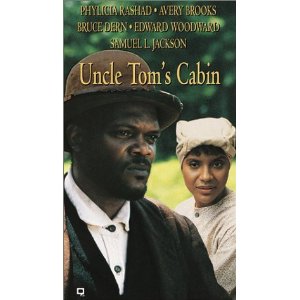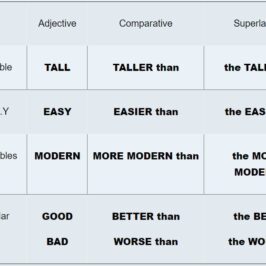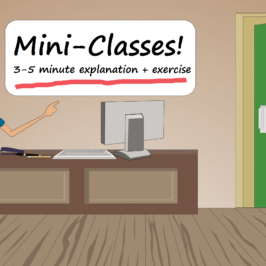When Abraham Lincoln met the writer Harriet Beecher Stowe after the start of the American Civil War he is reported to have said: ‘So you’re the little lady whose book started this great war!’
Her novel, published in 1852, is arguably the most important work of American literature, credited with having raised awareness of the evil of slavery and leading to its abolition in the northern states, before being finally abolished across the country following Lincoln’s victory in the Civil War.
‘Uncle Tom’s Cabin’ was Tolstoy’s favourite book, and managed to outsell the Bible in its first year of publication, becoming the bestselling novel of the 19th Century. Practise your English with an exercise from the second chapter of the novel. Then you can download the book and read it together with the complete audiobook, also on this page.
Uncle Tom’s Cabin
Chapter 2: The Mother
Eliza had been brought up by her mistress, from girlhood, as a petted and indulged favorite.
The traveller in the south must often have remarked that peculiar air of refinement, that softness of voice and manner, which seems in many cases to be a particular gift to the quadroon and mulatto women. These natural graces in the quadroon are often united with beauty of the most dazzling kind, and in almost every case with a personal appearance prepossessing and agreeable. Eliza, such as we have described her, is not a fancy sketch, but taken from remembrance, as we saw her, years ago, in Kentucky.
Safe under the protecting care of her mistress, Eliza had reached maturity without those temptations which make beauty so fatal an inheritance to a slave. She had been married to a bright and talented young mulatto man, who was a slave on a neighboring estate, and bore the name of George Harris.
This young man had been hired out by his master to work in a bagging factory, where his adroitness and ingenuity caused him to be considered the first hand in the place. He had invented a machine for the cleaning of the hemp, which, considering the education and circumstances of the inventor, displayed quite as much mechanical genius as Whitney’s cotton-gin.*
(*Author’s Note: A machine of this description was really the invention of a young colored man in Kentucky.)
He was possessed of a handsome person and pleasing manners, and was a general favorite in the factory. Nevertheless, as this young man was in the eye of the law not a man, but a thing, all these superior qualifications were subject to the control of a vulgar, narrow-minded, tyrannical master. This same gentleman, having heard of the fame of George’s invention, took a ride over to the factory, to see what this intelligent chattel had been about. He was received with great enthusiasm by the employer, who congratulated him on possessing so valuable a slave.
He was waited upon over the factory, shown the machinery by George, who, in high spirits, talked so fluently, held himself so erect, looked so handsome and manly, that his master began to feel an uneasy consciousness of inferiority. What business had his slave to be marching round the country, inventing machines, and holding up his head among gentlemen? He’d soon put a stop to it. He’d take him back, and put him to hoeing and digging, and “see if he’d step about so smart.” Accordingly, the manufacturer and all hands concerned were astounded when he suddenly demanded George’s wages, and announced his intention of taking him home.
“But, Mr. Harris,” remonstrated the manufacturer, “isn’t this rather sudden?”
“What if it is? — isn’t the man mine?”
“We would be willing, sir, to increase the rate of compensation.”
“No object at all, sir. I don’t need to hire any of my hands out, unless I’ve a mind to.”
“But, sir, he seems peculiarly adapted to this business.”
“Dare say he may be; never was much adapted to anything that I set him about, I’ll be bound.”
“But only think of his inventing this machine,” interposed one of the workmen, rather unluckily.
“O yes! a machine for saving work, is it? He’d invent that, I’ll be bound; let a nigger alone for that, any time. They are all labor-saving machines themselves, every one of ’em. No, he shall tramp!”
George had stood like one transfixed, at hearing his doom thus suddenly pronounced by a power that he knew was irresistible. He folded his arms, tightly pressed in his lips, but a whole volcano of bitter feelings burned in his bosom, and sent streams of fire through his veins. He breathed short, and his large dark eyes flashed like live coals; and he might have broken out into some dangerous ebullition, had not the kindly manufacturer touched him on the arm, and said, in a low tone,
“Give way, George; go with him for the present. We’ll try to help you, yet.”
The tyrant observed the whisper, and conjectured its import, though he could not hear what was said; and he inwardly strengthened himself in his determination to keep the power he possessed over his victim.
George was taken home, and put to the meanest drudgery of the farm. He had been able to repress every disrespectful word; but the flashing eye, the gloomy and troubled brow, were part of a natural language that could not be repressed, — indubitable signs, which showed too plainly that the man could not become a thing.
DOWNLOAD THE FULL BOOK HERE!
Questions
True or False?
TRUE
FALSE
FALSE
FALSE
FALSE (He was not sold)
FULL AUDIOBOOK








Leave a Reply